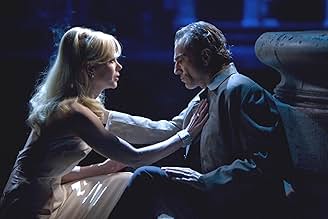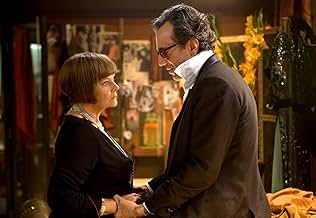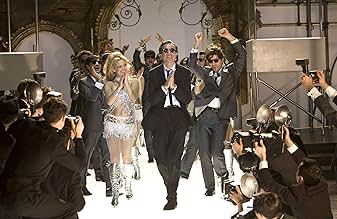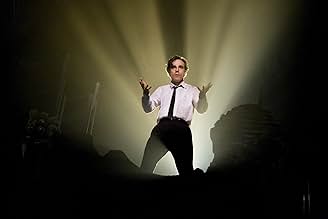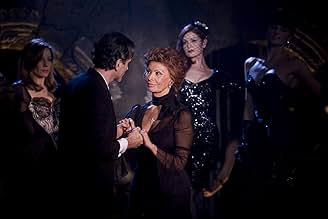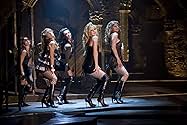Le célèbre réalisateur Guido Contini lutte pour trouver l'équilibre dans sa vie professionnelle et personnelle, alors qu'il s'engage dans des relations dramatiques avec sa femme, sa maîtress... Tout lireLe célèbre réalisateur Guido Contini lutte pour trouver l'équilibre dans sa vie professionnelle et personnelle, alors qu'il s'engage dans des relations dramatiques avec sa femme, sa maîtresse, sa muse, son agent et sa mère.Le célèbre réalisateur Guido Contini lutte pour trouver l'équilibre dans sa vie professionnelle et personnelle, alors qu'il s'engage dans des relations dramatiques avec sa femme, sa maîtresse, sa muse, son agent et sa mère.
- Nommé pour 4 oscars
- 8 victoires et 60 nominations au total
Avis en vedette
Performances: Let me first say that no actress delivered any less than they possibly could, and you could tell that the cast had worked their butts off during production.
The Great- Marion Cotillard in particular delivered what is sure to be one of the most understated performances in recent memory, as well as delivering the two most powerful and emotional numbers in the show. Penelope Cruz was SEXY, and as her character's story was wrapped up she beautifully portrayed a "mistreated mistress," so to speak. Judi Dench was fantastic as the background player in Guido's career, perfectly delivering wit while supporting her friend. Most importantly, these three worked so well because they were interlinked in each other's story, and as a result their plot lines flowed well into each other.
The OK- DDL and Sophia Loren were fine in their parts, simply filling out their roles and not seriously improving on or dragging down the movie in any way.
The Misused- Nicole Kidman, Kate Hudson, and Fergie were all criminally misused, although fantastic when on the screen. All three had stories that didn't synch with the movie, whether they be Kidman (who honestly needed a more fleshed out role that came in contact w/ other characters other than just Guido), Hudson (whose number really felt like it would have made more sense in the beginning of the movie), or Fergie ("Be Italian" felt shoehorned in and disconnected, and would have been a perfect opener or closing number). All three felt particularly disconnected from the film.
I can honestly say that not one of the players in Marshall's cast disappointed, but it was Marshall himself and the messy script (irony!) that jumbled up the movie and left me with a very disjointed, disconnected result. Each scene was Oscar-worthy, but they were only partially threaded together into a cohesive story.
This time he has chosen Nine, a re-imagining of Federico Fellini's classic film 8 1/2. Already I am skeptical of the situation. I am fine with musicals. Some of the best films on celluloid have been musicals. What I have a problem with is the reworking of such a classic film like 8 1/2. It would take a lot of convincing to win me over. Unfortunately, it did not succeed.
Daniel Day-Lewis stars as Guido Contini, an Italian director who is planning on making the most important Italian film ever call Italia. The only problem is he hasn't written a script yet. To guide him he turns to the women in his life. His late mother (Sofia Loren), his wife Marion Cotillard, his mistress (Penelope Cruz), his costume designer and closest friend (Judi Dench), a fashion reporter (Kate Hudson), a childhood temptress Saraghina (Stacey "Fergie" Ferguson) and his leading lady (Nicole Kidman).
Contini tries to escape the pressure looming overhead by the media, his producers, and his cast and crew. He is constantly searching for the answer, bouncing around from one person to another. That's really all there is. He talks to people, sleeps around, and goes into his past.
Right off the bat there is a slight problem. There are too many women! Not just for Contini but for the audience. There are too many big name actresses with almost equal parts. Who is more important? Who should we side with? It seems like he has such a close relationship with some of them and hardly any with others, yet they all practically get the same amount of screen time. They all have at least one song to their own.
That is another problem with the film. The musical aspect is distracting from the story. The music for the most part is average. A few songs like "Be Italian" and the Oscar nominated "Take it All" are very good, but for the most part, it's all bells and whistles. Like he did with Chicago, Marshall takes us from the real world of dialogue to the imaginary world of singing and dancing. My issue with this is that he spends an almost equal amount of time in both places. With Chicago, there was more story divulged in the real world. Nine has too much singing and not enough story telling.
The musical numbers are impressive, in particular the two songs I mentioned. Fergie really flexes the golden pipes with "Be Italian," a fun and sexy number that for me was the highlight of the film. Cotillard's number was also one of the better ones. This was a more emotional struggle and was one of the few numbers I felt really connected with the story. Kidman and Cruz each have decent numbers, and Dench's number is a bit over the top. She is better with the real world scenes.
I guess Marshall tried to replicate what he did with Chicago but came up short. I never was invested with any of the characters and Lewis' performance was not quite what I was looking for. I would have loved to have seen Raul Julia, the original Guido Contini from the first Broadway production, or even Antonio Banderas in the revival. I think someone with a more musical background would have been a more acceptable choice, but nevertheless, Lewis does a fairly decent job.
Daniel Day-Lewis leads the cast, playing Italian filmmaker Guido Contini, who is about fifty, and going through something of a midlife crisis. Lewis brings a lot of panache to the role, belting out his lyrics with such assurance that this part has been well-practiced and a certain amount of passion has been brought into it, playing the character perfectly.
His long-suffering wife Luisa, splendidly re-imagined, not played by Marion Cotillard, is the one gem in the cast that outshines all of its other members. You feel emotion for her character that you don't feel for the others, you can tell that her character has been through a lot, and you're happy to see her come out on top at the end.
Penelope Cruz also adds a lot to the film, playing Contini's mistress, Carla, a role that 30 Rock's Jane Krakowski played on Broadway, Cruz also brings a lot of emotion and sass, often simultaneously, to her role. You really understand Contini's predicament, and sympathize with the character, for not being able to break her heart, or that of his wife. Her musical number brings a lot of excitement, and her enthusiasm, and her roaring Soprano is unlike anything we ever thought we'd see from this actress. I see her winning awards a-many for her performance in this.
Dame Judi Dench, always worthwhile, plays Lilli, Contini's wisecracking costume designer and confidante. Dench brings comic relief, having more scenes than any other of the actresses in the film, but also brings depth, playing a kind of a psychiatrist to the lead character, and also bringing a fantastic voice, for her musical number, which contains many chorus girls in feather boas, you think you're watching The Rockettes or something out of A Chorus Line, but for the song, it certainly works.
Fergie plays Saraghina, a figure from Contini's youth who taught him about love, and how to attract a woman. Fergie only has one scene in the movie, basically. She shows up in the overture, and finale, but, her only big scene is her show-stopping musical number Be Italian, which generated applause in my theatre. It makes me wonder if they used Fergie less, because maybe her acting talents were not up to par. I guess we'll never know, but her singing voice is something we didn't even expect from her, as she belts the lyrics with such undeniable passion and exuberance, you're glad this minor role was played by her.
Nicole Kidman plays Contini's muse, actress Claudia Jensen, who is mentioned in the film's beginning, then disappears until close to the movie's end. I kind of feel like Kidman's obvious musical talent, displayed previously in Moulin Rouge, come off as a bit underused, because she has one of the best singing voice among the cast and she only has one song. That's one of the few things that bugged me about this wonderful movie.
Kate Hudson plays American magazine journalist, Stephanie, who isn't in very much of the movie either, but Kate Hudson's big musical number, Cinema Italiano, written specifically for the movie, is amazing. I hate to use the word "amazing", because I think it's overused and it's lost its affect, but it's the only way to describe this scene, the way that director Rob Marshall cut the number, switching from sequences in black and white, then color, then black and white again, it's a truly unique experience that you really need to see to completely understand. And here's a surprise, Kate Hudson can sing. I thought she was only cut out for mid-level rom-coms, but I'm glad to say I was wrong, she definitely fits in with the musically talented cast of this movie.
Sophia Loren plays Contini's mother, who is tragically underused, but brought in at the right times in the movie. She, again, only has one song, but it feels like enough, for this actress, who's still looking great, at age 75, bringing drama to her role, and she gives more than she needs to, but it's certainly good to see her on screen again.
The direction of the movie is just as much one of the stars of the show. Rob Marshall, having directed Chicago and Memoirs of a Geisha knows a thing or two about grand-scale production musical numbers and high-octane drama, and he brings it all to this film, although some of the songs are cut in a way that feels chaotic and rushed, but I think it doesn't hurt the movie at all. It's a movie built on high caliber acting, beautiful music, and gorgeous imagery, and it's something you have to see for yourself. It's that good.
The film hands down is a wonderful homage to Federico Fellini, in his visual style, the women chosen represent Fellini's size of aesthetic view just like Kidman reminds you of young Anita Ekberg, Cotillard has the same diva material as Anouuk Aimee and Kate Hudson the figure and pallet of American stars that pleased Il Maestro Fellini. If you are familiar with this wonderful director, you'll enjoy "Nine" the better.
Then, I believe music helps to boost the theme and moral of the story. Generally outlined the whole musical is an ego-fest, all around Guido, Guido, Guido, his mess, his women, himself over himself. His ego being put into the light, with each song sprouting in the exact moment with "joie de vivre" and vitality, the women from Kidman to Dench showcasing enormous femininity and composure.
"Les Folies Bèrgere" piece says it clearly. What you need is the laughter, the lights, the color. The music, the "pleasure of living". Nine has it, it has it all while at the same time plays the keys that Maestro Fellini would have liked to hear if he was still with us.
The original movie was a phantasmagoric blending of memory, reality and wish-fulfillment fantasy, focused on a major Italian film director caught in creative crisis (a figure obviously based on Fellini himself). Daniel Day-Lewis takes on the role, made famous by Marcello Mastroianni, of the filmmaker (now named Guido Contini) who "has nothing left to say" - either as a man or as an artist - a man so harried and hounded by producers, subordinates, reporters, detractors, sycophants, and assorted hangers-on that he sneaks away for a rest-cure at an out-of-the-way health spa. With all his creative juices dried up and feeling that he will have a nervous breakdown if he has to make even one more statement or executive decision regarding his film, Guido, like many of us, believes he will find the peace he so desperately yearns for by retreating from the outside world. But Guido soon discovers that there is no escaping from the people and pressures of the world in which we live - nor from our religious and familial upbringing - for they are each of them an integral part of the fabric that makes us who we are.
Visually, "Nine" captures all the flash, dash and excitement of life among the glitterati in the Eternal City circa 1965. In terms of plot and incident, the Michael Tolkin/Anthony Minghella screenplay (itself derived from Arthur Kopit's Broadway adaptation) follows the original fairly closely, but what's missing is the spark of cinematic genius that Fellini alone could bring to the material. But can one reasonably have expected that, anyway? As a director, Rob Marshall does an impressive job re-staging the dramatic portions, but he certainly doesn't have Fellini's flair for the carnival-like atmosphere that became a signature feature of all his later works (but, then again, who does?). However, as he did in "Chicago," Marshall demonstrates that he knows how to slide in and out of the musical numbers without being unduly jarring about it. That's particularly challenging given that most of the numbers - which serve as reflections of the characters' thoughts and feelings and the movie's themes - are done largely on surrealistic soundstages, as opposed to the on-location filming of the non-musical portions of the movie.
No surprise, Day-Lewis is superb as the dashing but world-weary director (truly as much a celebrity as an artist), perfectly capturing the angst, frustration and conflict taking place deep within the soul of a creator who still has so much to say - despite his protestations to the contrary - but not the slightest clue of how to say it. Guido is clearly trying to be a good person, but all those inner demons are doing their best to thwart him at virtually every turn. There are many moving moments of deep introspection, as Guido contemplates the direction of his life and the effect his actions are having on the people he loves. I'm going to go out on a limb here, and it may sound like blasphemy even to say this, but Day-Lewis lets us see his character's pain in a way that even Mastroianni himself did not. Interestingly, by tamping down some of Fellini's cinematic "distancing devices" and icy-cool tone, the movie actually allows us to relate with Guido on a more personal level and to care more deeply about his plight.
Marion Cotillard replaces Anouk Aimee as Guido's devoted but long-suffering wife who knows about her husband's infidelity and who suspects he has become a filmmaker as a means both of avoiding having to deal with real life and of achieving personal forgiveness and redemption for himself; Penelope Cruz stars as Guido's flighty mistress, whose sudden appearance at the spa throws Guido's world into a tizzy; and Sophia Loren puts in an occasional appearance as Guido's recently deceased mother who gives him words of advice and comfort from beyond the grave. Nicole Kidman portrays Claudia, the beautiful young starlet who loves Guido but ultimately refuses to be just another of his numerous "conquests." Judi Dench plays the fashion designer who appears to be the one level-headed and brutally honest person whom Guido can turn to for advice and support. And all of them are excellent.
One thing that "Nine" has going for it that "8 ½" didn't is the perspective that comes with the passage of time. When the original was released, it WAS "Italian Cinema" - and everything that went along with that term. As a result, the movie was totally unconscious of itself and the place it and other films of its time period would occupy in movie history. "Nine," with the ability to look back on the era from a much later perspective, is able to convey all this in a way that those earlier films, including "8 ½" itself, could not. In this sense, "Nine" sees "8 ½" more as an artifact than as the contemporary trailblazer it was in its time.
As with all remakes and "re-imaginings" of classic works, we must finally ask ourselves the crucial question: "Is this trip really necessary?" I think in the case of "Nine," I will have to go with "Yes" - or, if not "necessary," at least audacious and stimulating. "8 ½" aficionados and Fellini purists may have trouble warming up to this version, but I see it not as a denigration of the master and his great work, but as a tribute to them.
Le saviez-vous
- AnecdotesWhen it was decided to make a play out of Federico Fellini's 8 1/2 (1963), the rights were easy to obtain from Fellini; his only condition was that neither his name nor the title 8 1/2 should be connected to it.
- GaffesWhen Guido drives up to the Cinecitta film studios in his open top Lancia with his producer as passenger, parked outside (to left) is a (quite distinctive) two tone white and blue paint job rear-engined (flat front radiator) car (another Lancia?): as soon as they pull up inside the lot, as they exit the car and walk around the lot, camera pulls back to show an exact same (license plate same /similar) car parked on other side.
- Citations
Luisa Contini: Thank you.
Guido Contini: What for?
Luisa Contini: Thank you for reminding me I'm not special. You don't even see what you do, do you? Even the moments I think are ours, it's just you working to get what you want.
- ConnexionsFeatured in The Jay Leno Show: Episode #1.44 (2009)
Meilleurs choix
Détails
Box-office
- Budget
- 80 000 000 $ US (estimation)
- Brut – États-Unis et Canada
- 19 676 965 $ US
- Fin de semaine d'ouverture – États-Unis et Canada
- 257 232 $ US
- 20 déc. 2009
- Brut – à l'échelle mondiale
- 54 004 950 $ US
- Durée1 heure 58 minutes
- Couleur
- Mixage
- Rapport de forme
- 2.39 : 1
Contribuer à cette page








